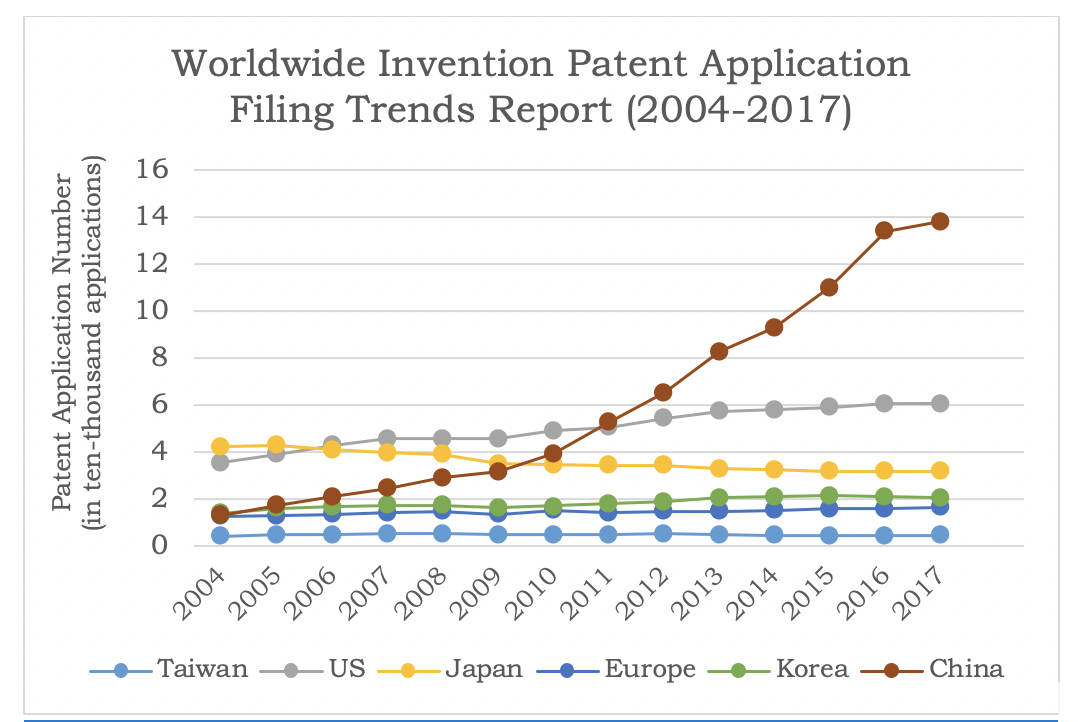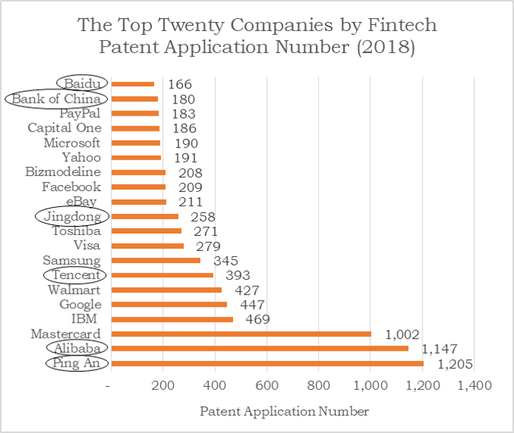Innovation and
|
Emerging TechnologyIP Monetization in China
AI, big data, and blockchain are changing the business norms of the world and China is leading in these areas. How does this competitive advantage foster China’s innovation ecosystem and help to exploit the value of IPs?
China, like a few other countries worldwide, is experiencing an industrial revolution driven by AI and other emerging and disruptive technologies, such as big data and 5G technology. In fact, China is now leading in patent applications and thriving in business innovations from these emerging technologies. For example, more than three Chinese players (i.e., PingAn, Alibaba, and Tencent) have gained a strategic position through their patent portfolios for innovations relating to applications of AI and big data in Fintech.
The leading innovative companies as measured by invention patents filed in Fintech. (Source: IPRdaily)
IP Monetization is Benefiting from AI Application
In many aspects, AI technologies have the potential to enhance, unlock, exploit, and facilitate the findings of IPs’ intrinsic values, and thus facilitate the underlying transactions for IP commercialization. For example, AI combined with data mining technologies may help to conduct patent searches more efficiently. Until a few years ago, the preparation of a citation map for a patent could take weeks. Now, it is only one click away. In addition, AI supervised learning can assist professional appraisers to determine the value of a patent more objectively and consistently. These improvements are increasing the confidence of parties towards IP monetization deals and are increasing deal flows in the financial system. About a dozen startups in China are now building their business models around such AI applications in patent search services. Some leading teams have already distinguished themselves by integrating AI or big data valuation modules into their databases, while other market players are still using traditional IP search tools to evaluate IPs. IP Monetization in China is also Benefiting from Blockchain Blockchain was once a challenged area in China when its application was narrowly focused on cryptocurrency. However, in October 2019, to many people’s surprise, the top Chinese leaders summoned a high-level conference to discuss the merits of blockchain in the new technology revolution and industrial transformation.[i] This new initiative has spurred many startups, experiments, and research projects in these areas. For example, more and more legal scholars are now studying blockchain technology’s unique characteristics of timestamping and its resistance to retroactive alterations of data to propose amendments to the relevant regulatory regimes, utilizing this new, cutting-edge technology. Working Together to Mitigate Information Risks Emerging technologies, especially AI and blockchain technology, are expected to facilitate IP monetization in China. This expectation also applies to the endeavor regarding IP risk mitigation. For example, AI and big data technologies can connect patent information deposited at various relevant authorities in different locations. Previously in China, a patent appraiser was once needed to look into IP authorities, financial authorities, and commerce administration authorities to ascertain whether or not the patent was subject to any encumbrance of rights. Missing a piece of information could result in a miscalculation of the patent’s value. Comprehensive due diligence investigations require significant time and resources; therefore, an appraiser is often needed to balance the risk against the involved cost. Now in China, such risk may be mitigated by the previously mentioned patent search service providers by utilizing AI and data management technologies to gather information concerning a patent. More than ten of such service providers are available in China. Meanwhile, blockchain characteristics of timestamping and resistance to retroactive alterations are expected to reduce ownership disputes arising from patent inventorship or chains of titles in transactions. On the public side, the Chinese government is regulating blockchain’s underlying technology, i.e., cryptography. The State Cryptography Administration (SCA) has been in operation since 2019, and a dedicated regulation, i.e. Cryptography Law was promulgated in January 2020. The foundations for the regulatory framework regarding these emerging technologies are ready in place. These ongoing regulatory and policy developments are cultivating an environment where deal managers of IP monetization in China can find more tools or services to determine a more convincing value for the underlying IPs and mitigate transactional risks. Notes [i] 《习近平称中国要着力攻克一批关键核心技术 把区块链作为创新突破口》. 2019.10.25. https://www.reuters.com/article/xi-jinping-china-block-chains-tech-1025-idCNKBS1X41EM.
0 Comments
Leave a Reply. |
Categories
All
|


 RSS Feed
RSS Feed
